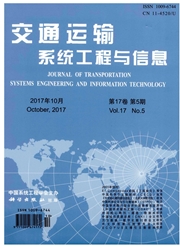

 中文摘要:
中文摘要:
综述了城际列车开行方案的研究现状.为准确描述客流与开行方案的互动关系,本文提出了模型建立的系统封闭性假设、列车种类划分假设、客流动态转化假设和选乘优先顺序假设等假设条件.在此基础上,对相关集合变量进行了描述,建立了反映不同类型客流转化过程的客流动态分配模型,构建了综合考虑铁路部门收益最大化、旅客总支出最小化和最大限度满足客流需求的多目标规划模型.针对建立的多目标0-1整数规划模型,采用遗传算法求解,并对规划模型求解的过程进行了说明,最后通过算例验证模型算法的有效性.
 英文摘要:
英文摘要:
This paper summarizes the research status of intercity train operating scheme. To precisely describe the interaction between passenger flow and operating scheme, it proposes assumptions of system closure, train type division, passenger flow dynamic assignment and selecting priority during the process of establishing model. Based on these, it describes relative variables and formulates the passenger flow dynamic assignment model to reflect the conversion process of different passenger types. Then it develops a multiple objective programming model considering maximum railway department revenue, the smallest passenger total expenditure and the maximum passenger demand. It also uses the genetic algorithm to solve the established multi-objective 0-1 integer programming model. Finally, a numerical example is provided to illustrate the effectiveness of this algorithm of model
 同期刊论文项目
同期刊论文项目
 同项目期刊论文
同项目期刊论文
 期刊信息
期刊信息
